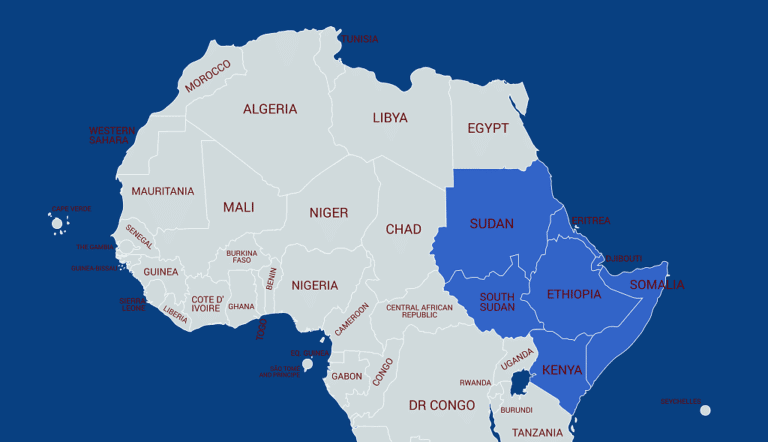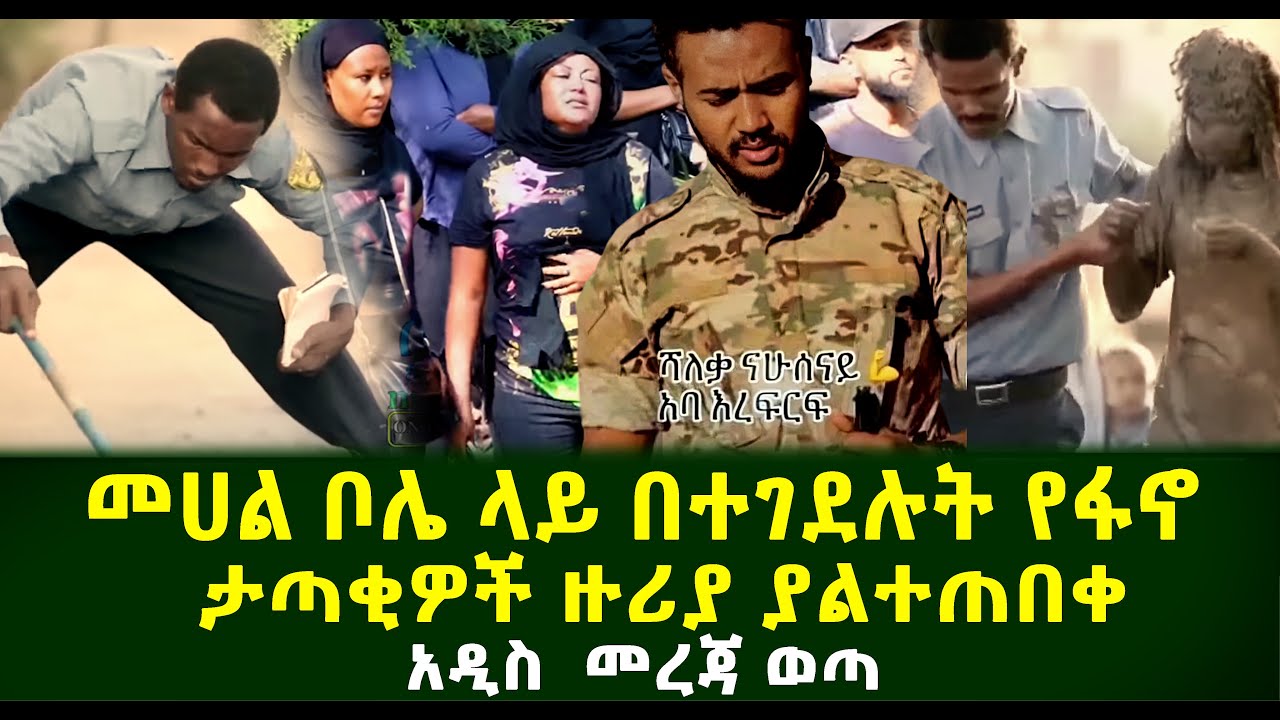
By Dr. Suleiman Walhad
October 29th, 2022
The Horn of Africa States is as old as humanity itself. It is often referred to as the birthplace of humanity from whence people spread to the rest of the world and hence, and for once, it needs the gratitude of its sons across the world, although they would have moved away thousands of years ago. Its historical significance is not the reason it still matters and why it is still in the news and media of the world almost everyday. Its present significance is equally important if not more relevant in today’s definitely disturbed world, where greed and lies are the main driving forces of some men in important places of the world.
The Horn of Africa States is some 1.8 million square kilometers and enjoys a coastal belt of some 4700km, not counting its many islands, some under its control but others under the control of non-regional actors. Its seas and oceans not only provide one of the main sea-lanes of the world, but also contain significant hydrocarbon products and other minerals that is in great demand today and mostly for the warring Europeans, who have shot themselves in the feet by cutting off their traditional supplies. It is the source of the Blue Nile that provides fresh water to millions of people not only in the region itself but also millions more in faraway Northeast Africa. The Horn of Africa is an ecosystem that can feed itself instead of its current set up as the hungry place where people starve almost daily, should it be left alone by the malicious forces, which are hell-bent to keep it that way. Rats breath on the place they bite, less the victims feel the pain of the bite, so they say, in the Horn of Africa States, and those who pretend to be feeding the people of the Horn of Africa States are no different than those rats. They bring in some food, but not enough anyway, to have the region stay in a painful state.
The region enjoys the roof of Africa, the Simien Mountains and it enjoys a vast savannah, and it enjoys both enough salt and fresh waters that provide significant seafood and fish not only to feed itself but also many millions more in the world. The mineral wealth, the agricultural wealth, the livestock and the wildlife, it owns also demonstrate the immensity of the region and what it can offer to humanity.
Yet, this beautiful picture does not represent the region. Misery, hunger and starvation, conflicts and wars and involvement of non-regional actors, the so-called international community, but literally very few countries, mark the region. It would have been wiser if they left the region alone and this would have been more beneficial for them. The region, if it needs to exploit its riches, would have shared this wealth with them anyway.
The region currently represents itself as four countries that seem to be moving in different directions, sometimes clashing among themselves in their bids to please non-regional actors, when they should have been working together for the benefit of the people of the Horn of Africa – people who enjoy the same ethnic composition, suffer the same social ills and diseases, and indeed, who have the same destiny. Why do some members of the Horn of Africa join other ethnic groupings such as the Arab League or the East Africa Community that have their own interests, which completely contradict with the interests and destiny of the Horn of Africa States? Somalia and Djibouti are both Horn African and non-Arab, but they are members of that dysfunctional institution that not only failed them but also its Arab people. Why should they continue to be in an institution with which their people other than the Islamic religion share truly little with. There are so many other Muslim countries that are not members of this Arab League institution and being Muslim and close by does not qualify these two countries to be members of the organization. They were literally hoodwinked to join. Djibouti and Somalia were both seen as a protective belt for the Arabian Peninsula in the South. It is even more disconcerting when one sees Somalia vying for or should we say, being pushed, to join another community that Somalis, as a people, share extraordinarily little with – The East Africa Community. Instead of sharing its unexploited potential wealth with its natural grouping of the Horn of Africa States, Somalia has even appointed a “Special Envoy” to smoothen the way to join the EAC. Is this to serve Somalia or serve the interests of one person or a few people who have significant, stolen wealth in that region. Joining the East Africa Community will be another liability for Somalia. Here is why:
- Somalis do not speak Kiswahili and they do not speak Arabic either. Arabic is only used for religious ceremonies and prayers but not for communicating, sciences, politics or other ways in Somalia. Kiswahili would be even worse, for there would be no use for that language in the country. It would be disastrous for Somalis participating in EAC conferences and summits or even meetings where the language of communication would be Kiswahili. The same has been amply demonstrated in the case of the Arab League, where many Somali delegations sent to participate in Arab league committees, found themselves in embarrassing situations. Why would the Government of Somalia repeat the same mistake, when they know that the country erred once before?
- Current members of the EAC all enjoy semi-industrialization and produce many goods and products that can flood the Somali markets. What would Somalis produce to counter the current EAC advantages in this regard. At present, we say, none!
- Only losers will be appointed to represent Somalia in the EAC, and this would be a major disaster for the nation when its best cannot represent it.
- The EAC represents governments and countries that seem to be cohesive and functional, whereas Somalia remains far behind. It does not even have full control over its territory. It is mired by miseries, the most important and significant of which is lack of proper leadership to steer the country, in this difficult period of its history. It cannot deliver what the EAC agreed upon. Somalia’s leadership needs to rethink on the matter very carefully before plunging itself into a disaster. The EAC should not open the door for Somalia until it puts its house in order first and is fully willing to fulfill all the requirements of the EAC. Remember Turkey! The Europeans declined to accept this great country, for there are certain crucial factors that would definitely make Turkey clash with the rest of Europe down the road. And so would Somalia with the EAC, mainly for historical reasons.
There are many other factors which would deny Somalia joining the EAC, but this should suffice for the time being. Somalia can easily join the HAS (a grouping of the Horn of Africa States). This is because the Horn of Africa States are almost at the same level in political setup and maturity. They all deal with significant political and internal issues. All the four countries of the Horn of Africa States enjoy the same heritage and ethnic composition in general and the mixing of the populations would not cause any serious issues. The populations lived together and traded with each other almost from the beginning of humanity and as a group, they have built empires that sometimes went and extended beyond the region, including as far as India. According to Dr. Clyde Winters, “Horn Africans have had very intimate relations with Indians.” Dr. Clyde Winters further reported that in antiquity, Horn Africans ruled much of India, denoting the similarities in the Indian and Somali languages, for example. “Magaalo” in Somali for a “township” or “diyaar” for being “ready” or “gaadhi” for a “car”, or a “doobi” for a “laundryman”, or for that matter the “Haa” and “Aamus” for “yes” and “be quiet” respectively or “baraf” for “ice”, to take a few is a clear indication of the closeness of the two peoples of South India and the Horn of Africa States. The traditional Ethiopian and Eritrean dress or the Djibouti Afar girls’ nose piercing is not much different from those of South Indians. The Horn Africans who ruled much of India were called the Naga, and they created the Sanskrit. The Naga were said to be great seamen, and they ruled much of India, Sri Lanka, and Burma. They were known to be warlike as they present themselves today. It would seem nothing has changed with them!
They are mentioned in the Ramayana and the Mahabharata. Dr. Clyde Winters further notes that, “In the Mahabharata we discover that the Naga had their capital city in the Dekkan, and other cities spread between the Jumna and Ganges as early as 1300 BC. (“Ancient African Kings of India – By Dr. Clyde Winters”).
On the economic front, developments of the SEED countries are not that much apart, and the four countries can rise together at the same time. Achieving food , energy and water security are all important for the region and the coastal and interior complementarity is significant. The interior lands where most people live need many outlets to the sea, which the coastal parts of the region offer. The youthful population of the region provide the necessary labor for all industrial ventures.
The size of the population (some 160 million) represents a sizeable market, which is good for any entrepreneuring businessmen to take advantage of. The region offers a historical perspective and beautiful mountains, valleys and white beaches for a significant tourist industry, supported by an agreeable climate, fauna and flora, rivers and lakes and a diverse animal population. Water sports be they riverine or lakes or seas and ocean are available for those adventurous sportsmen and women and giving them a break from the cold winters of the far north of the northern hemisphere.
On the security front and on foreign policy, united, the region will stand firm and stronger, and each of the four countries would not be hunted individually, as is the case now. A strong united Horn of Africa will be a force to reckon with as they were in the past. It is time the present leadership of the region revisited their calculations and protected each other from the roaming wolves that have come to the region from afar and from not too far either. Dismembering of the Horn of Africa States and segregating each country from the others is one of the main methods for weakening the region. The continuing and endless internal conflicts and political turmoil in each country demonstrate that this is not natural but deliberately manufactured by forces beyond the region, using the artificially created poverty and starvation to achieve their despicable goals.
https://zehabesha.com/the-horn-of-africa-states-the-need-for-a-new-solidarity/

No comments:
Post a Comment